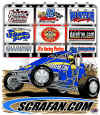


|
Traditional Sprint Car FanSite |
See You At The Races!!! |
| Back
To The Grass Roots by Norm Bogan |
|
|
|
I’m a
guy who follows the SCRA Sprint Cars on a regular basis along with IRL and NASCAR. While
I enjoy attending the weekly shows and televised races, sometimes you just want
to go back to your roots. Saturday
night, June 6, was an off night for SCRA and I could have stayed at home and
viewed the IRL at Texas or Winston Cup at Richmond.
What I did was much more enlightening and enjoyable.
I ventured off to Ventura Raceway, which I call the “Friendly Little
Track by the Sea” and they call the “Best Little Dirt Track in the
Country”. Both
claims well describe this outstanding venue.
The track staff is both friendly and accommodating.
They work very hard to present their fans with a top-notch program,
preparing the track well and keeping the show moving along.
Even though they ran six classes of racers, the show was finished at
about 10:30. Drawing
me in this night, was that the racers were my neighbors and yours.
The guy running the Street Stock is just like your neighbor, who belongs
to two bowling leagues or the fellow from work who just bought a new bass boat.
These competitors chose racecars as their option for recreation.
They have a mortgage on their
house, credit card bills, orthodontist work for the kids and a racecar.
Saturday night at the track, is just like your neighbor spending Sunday
morning on the golf course. Money
spent to keep their car running, probably should have been used to paint the
house. Racers are just average
working slobs, who operate backhoes, weld, work the counter at the auto parts
store, check out groceries at the market, sell insurance and work on the
production line at a local manufacturing facility.
As you
survey the fans in the stands, you note that many are wearing shirts or jackets
with a car name and identification to one of the competitors.Many of the racers
are quite friendly competitors and help each other with parts and labor, when
trouble is encountered. The
families in the stands also sit together and root for their drivers. This
evening, there were twenty IMCA Sprint cars, fourteen IMCA Modifieds, eleven I-4
Modifieds, fourteen Street Stocks, twenty Pony Stocks and about seventeen
Go-Karts. Each class ran heat races
and a feature. To give you an idea
of what dedication these racers have, they must buy a pit pass for $15 and pay a
$20 entry fee for the car. There is
no qualifying, as positions are determined by points. The IMCA Sprint Cars and Modifieds run for a winner’s share
of $750 and the I-4 Mods and Street stocks pay the first four positions, with
the winner receiving $100. Go-Karts
pay about $40 to win and Pony Stocks get paid in experience. In
talking with the competitors, I found that IMCA Sprints and Mods cost about
$10000 plus to put a car on the track. The
I-4 Mods are nearly the same, while Street Stocks will set you back about $5000
to $7000. The Pony Stocks cost
about $2000 to field a car and Go-Karts run about $1500 to $2000. All the classes run spec tires, which are a harder compound
and will last part of the season, instead of needing new tires every week or
two. One of
the Pony Stock drivers said that he allotted an $8000 budget to run for the
year. This included pit passes,
entry fees, trailer and buying a used car and maintaining it for the year.
That’s a long way from the multi-million dollar budgets for the IRL and
Winston Cup racers. As you
can see, this isn’t the lucrative money sport that we see on TV, but it allows
many average folks the chance to realize a dream of being a race driver. This is the level that they can afford and it serves as the
recreational outlet for the whole family. Every
so often, one of these anonymous souls emerges from the pack and becomes the
next Jeff Gordon. Nearly all the
heroes we view on TV, started at one of these small tracks, in a class very
similar to this night’s show. Another
interesting sidelight about racing people with their roots at a track like
Ventura, is that flagmen in two major national series, cut their teeth at this
little track. Brian Howard, who
flagged most all of the USAC Midget and TQ events at Ventura is now the Flagman
for the IRL, which includes the Indy 500. Another
who grew up at Ventura and started flagging at about sixteen is Chris Morgan,
who now waves the colors with the NASCAR Craftsmen Truck series. If you
get bored watching the high finance of televised auto racing, take off on a
Saturday night and go BACK TO THE GRASS ROOTS.
|
